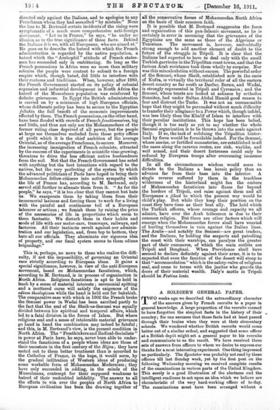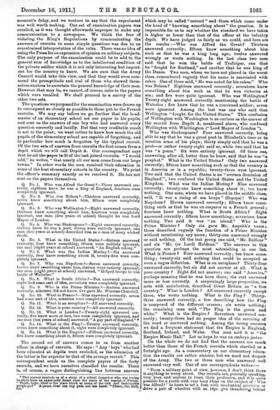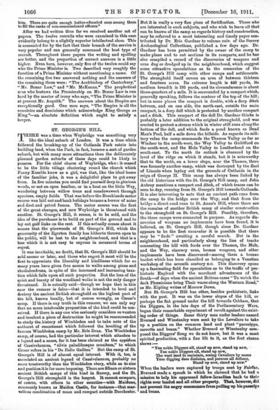A SOLDIER'S GENERAL PAPER. T WO weeks ago we described the
extraordinary character of the answers given by French recruits to a paper in general knowledge. A large proportion of the recruits seemed to have forgotten the simplest facts in the history of their country; for one assumes that these facts had at least passed through their brains when they were at their elementary schools. We wondered whether British recruits would come better out of a similar ordeal, and suggested that some officer at a British depot might set a general paper to his recruits and communicate to us the result. We have received three sets of answers from officers to whom we desire to express our thanks for a most interesting experiment. One thing impressed us particularly. The Spectator was probably not read by these officers till last Sunday week, yet by the first post on the following Wednesday morning we received complete results of the examinations in various parts of the United Kingdom. This surely is a good illustration of the alertness and the intelligent readiness to act upon an idea which we believe are characteristic of the very hard-working officer of to-day. The examinations must have been arranged without a
moment's delay, and we venture to say that the experiment was well worth making. One set of examination papers was recalled, as it was thought afterwards improper to make any communication to a newspaper. We think the fear of violating the King's Regulations by communicating the answers of recruits to some simple questions was due to an overstrained interpretation of the rules. There was no idea of using the Press for an expression of opinion on military subjects.
The only purpose of the examination could be to add to the general sum of knowledge as to the intellectual condition of the private soldier which it is not only interesting but import- ant for the country to know. We are sure that the Army Council would take this view, and that they would even com- mend the promptitude and zeal of those who showed them- . selves anxious to ascertain the general knowledge of their men. However that may be, we cannot, of course, refer to the papers which were recalled. We shall proceed to a survey of the other two sets.
The questions we proposedfor the examination were drawn up to correspond as closely as possible to those put to the French
recruits. We may say before we go further that the head- master of an elementary school set our paper to his pupils, and sent us the answers of one boy who had answered every question correctly and lucidly. But that very creditable result is not to the point ; we want rather to know how much the old pupils of the elementary school are capable of forgetting, and in particular how much is forgotten by the typical recruit.
Of the two sets of answers from recruits the first comes from a depot which we will call Depot A. Our correspondent says that lie set the paper te 35 of the last-joined recruits. "I would add," he writes, "that. nearly all our men come from our large
towns." In other words the men received their education in some of the beat elementary schools in the country. We print the officer's summary exactly as we received it. He has not sent us the papers themselves.
Q. No. 1. Who was Alfred the Great ?—Three answered cor- rectly, eighteen knew he was a king of England, fourteen were cempletely ignorant.
Q. No. 2. Who was Nelson P—Thirteen answered correctly, seven knew something about him, fifteen were completely ignorant.
Q. No. 3. Who was Wellington P—Eight answered correctly, thirteen knew something about him, fourteen were completely ignorant, one man (five years at school) thought he was Lord Mayor of London.
Q. No. 4. Who was Shakespeare ?—Eight answered correctly, sixteen knew he was a poet, eleven were entirely ignorant, one man (five years at school) described him as a man of many wicked deeds.
Q. No. 5. What is the United States P—Sixteen answered correctly, four knew something, fifteen were entirely ignorant, one man (eight years at school) answered, "An English colony."
Q. No. 6. What was the Indian Mutiny P—Six answered correctly, four knew something about it, twenty-five were com- pletely ignorant.
Q. No. 7. Who was Napoleon P—Seven answered correctly, twelve knew something about him, sixteen were entirely ignorant, one man (eight years at school) answered, "Helped troops to win battle of Waterloo."
Q. No. 8. What is South Africa ?—Ten answered correctly, eight had some strrt of idea, seventeen were completely ignorant.
Q. No. 9. Who is the Prime Minister P—Sixteen answered correctly, nineteen did not know, five gave Mr. Winston Churchill.
Q. IN o. 10. What is France P—Nine answered correctly, seven had some sort of idea, nineteen were completely ignorant.
Q. No. 11. What is an aeroplane P—All answered correctly.
Q. No. 12. What is your country P—All answered correctly.
Q. No. 13. What is London P—Twenty-eight answered cor- rectly, five knew more or less, two were completely ignorant, and one man (ten years at school) answered, "A gay part of England." * Q. No. 14. What is the Flag P—Twenty answered correctly, seven knew something about it, eight were completely ignorant.
Q. No. 15. What is the Empire P—Fifteen answered correctly, five knew something about it, fifteen were completely ignorant.
The second set of answers comes to us from another officer in charge of recruits. He says : "Any 'boys' who had been educated at depots were excluded, as the education of the latter is far superior to that of the average recruit." This correspondent sends us the complete papers of the forty recruits, and we have ourselves classified the results. There is, of course, a vague distinguishing line between answers
• This answer reminds us of a story of a school inspector who was trying to elicit from an apparently dumb class the name of the capital of France. " Think, boys; what is the place which so many of the rich and fashionable people soy. A pause, then one boy pats out his hand: "Please, Sir, Hell, Sir."
which may be called "correct" and those which come under the bead of "knowing something about" the question. It is impossible for us to say whether the standard we have taken is higher or lower than that of the officer at the infantry depot. We have judged as fairly as we could, and here are the results :—Who was Alfred the Great P Thirteen answered correctly; fifteen knew something about him such as that he was a king long ago; twelve answered wrongly or wrote nothing. In the last class two men said that he won the battle of Trafalgar. one that he "fought for Scotland," and another that he was king of the Danes. Two men, whom we have not placed in the worst class, remembered vaguely that his name is associated with cakes. One of these said," He was noted for his cakes." Who was Nelson ? Eighteen answered correctly ; seventeen knew something about him such as that he won victories at sea ; and five were quite ignorant. Who was Wellington? Twenty-eight answered correctly, mentioning the battle of Waterloo ; five knew that he was a renowned soldier ; seven were ignorant. Among the last was one who said that Wellington "fought for the United States." This confusion of Wellington with Washington is as curious as the answer of the recruit from Depot A, mentioned above, who confused Wellington with Whittington (" Lord Mayor of London ").
Who was Shakespeare ? Four answered correctly, being able to say that he was a great poet in Elizabeth's time or to mention some of his plays ; thirty simply said that he was a
poet—or rather twenty-eight said so, while two said that he was "a poem." Six were entirely ignorant. Of these one, answering, after all, better than he knew, said that he was "a prophet." What is the United States ? Only two answered correctly; fifteen knew something such as that the country is
in America or is a republic; twenty-three were ignorant. Two said that the United States is an "oversee dominion of England"; two confused the United States and the United Kingdom. What was the Indian Mutiny ? Nine answered correctly ; twenty-one knew something about it ; ten knew nothing. One man, whom we have placed in the middle class,
said, "It was a rising of sea buoys" (Sepoye) ! Who was Napoleon ? Eleven answered correctly ; fifteen knew some- thing such as that he was an emperor or a French general ; fourteen knew nothing. What is South Africa ? Eight answered correctly ; fifteen knew something; seventeen knew nothing. Two said it was "an island." Who is the Prime Minister ? Only six gave Mr. Asquith's name ; three described vaguely the function of a Prime Minister without mentioning any name ; thirty-one answered wrongly
or said nothing. Of the last group one said, "Mr. Balfour" and six "Mr. (or Lord) Haldane." The answers to this question are perhaps the most astonishing in our list.
What is France ? Four answered correctly ; ten knew some- thing ; twenty-six said nothing that could be accepted as even a vague definition. What is an aeroplane ? Thirty-four answered correctly, but six did not answer at all. What is your country P Eight did not answer; one said "America," perhaps meaning that he was born there; the rest answered more or less correctly. A surprisingly large proportion, we note with satisfaction, described Great Britain as "a free country." What is London ? All answered correctly except three, who wrote nothing. What is the Flag P Thirty- three answered correctly, a few describing how the Flag is composed of the different crosses ; six wrote nothing;
the remaining man said, "The Flag is the green and white." What is the Empire ? Seventeen answered cor-
rectly; twenty-three had no proper idea of the meaning of the word or answered nothing. Among the wrong answers we find a frequent statement that the Empire is England, Scotland, Ireland, and Wales. One man said it is "the
Empire Music Hall." Let us hope he was an embryo jester. On the whole we do not find that the answers are much better than those of the French recruits which startled us a
fortnight ago. As a commentary on our elementary educa- tion the results are rather sinister, but we need not despair of the Army. The two or three men who answered well answered very well. One of our correspondents writes :—
" From a military point of view, however, I don't think there is anything to worry about. Our recruits are, generally speaking, very keen and zealous to learn their profession, and it is quite possible for a youth with very hazy ideas on the subject of 'Who was Alfred?' to learn to set a fuse with mechanical precision or drive a pair of wheelers with an 18pr. gun thundering behind
him. There are quite enough better-educated ones among them to fill the ranks of non-commissioned officers."
After we had written thus far we received another set of papers. The twelve recruits who were examined in this case evidently belong to a slightly superior intellectual class. This is accounted for by the fact that their branch of the service is very popular and can generally command the best type of recruit. Throughout these papers the writing and spelling are better, and the proportion of correct answers is a little higher. Even here, however, only five of the twelve could say who the Prime Minister is. Two described very roughly the function of a Prime Minister without mentioning a name. Of the remaining five two answered nothing and the answers of the remaining three were: 'The Archbishop of Canterbury," "Mr. Boner Law,". and "Mr. McKenna." The prophetical man who bestows the Premiership on Mr. Bonar Law is run hard by the master of irony who says, "The Prime Minister is at present Mr. Asquith." The answers about the Empire are exceptionally good. One man says, "The Empire is all the countries and dominions which acknowledge King George as King "—an absolute definition which ought to satisfy a lawyer.




















































 Previous page
Previous page